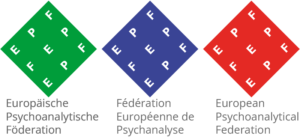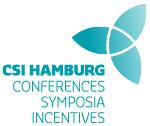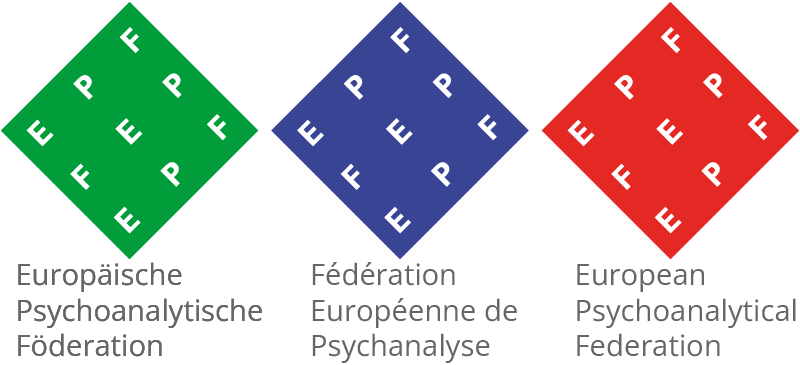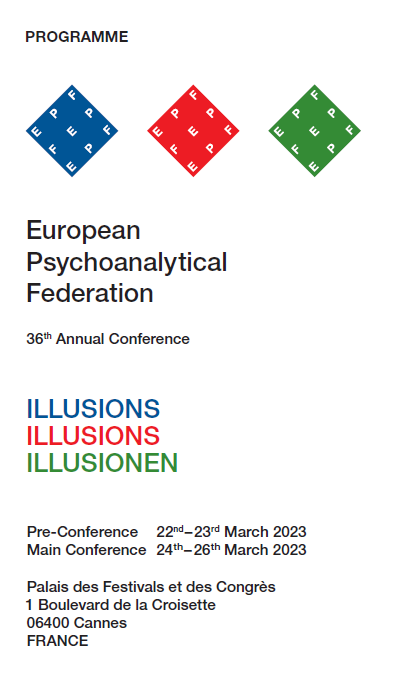36th EPF Annual Conference
Illusions - Illusions - Illusionen
22nd-26th March 2023 – Cannes, France
Registration early bird deadline: 1st March 2023
Venue and hotel
Palais des Festivals et des Congrès
1 Boulevard de la Croisette
06400 Cannes
France
Your arrival:
- Plane: Nice Côte d’Azur Airport (NCE) or Cannes-Mandelieu Airport (CEQ)
- Car: A8 motorway „La Provençale“, exit 42 „La Bocca“ or exit 40 „Cannes“
- Train: „Cannes“ train station
For restaurants or general information please visit the website of the Cannes tourist office: https://en.cannes-france.com/
Restaurants in the vicinity of the venue can be found here: https://en.cannes-france.com/stay-in-cannes/where-to-eat/
Programme
View and download the full programme here (PDF)
You will receive a full printed programme on site at the conference.
View the detailed programme below (to open each session please click on the title).
Please note that changes at short notice are only noted in the online programme.
Pre-Conference
Please click on the desired title to view further information.
09:00–16:00
This is an exclusive meeting.
Organisers‘ Office n° 15
Floor 1
14:00–17:00
Chair: Dieter K. Bürgin (Swiss Society of Psychoanalysis)
For IPSO members only.
Presented in English.
News Room 2
Floor 3
15:00–15:30
Chair: Fabienne Fillion (Belgian Psychoanalytical Society / Paris Psychoanalytical Society)
Press Room
Floor 3
15:00–18:00
Chair: Jean-Louis Fouassier (French Psychoanalytical Association)
This is an exclusive meeting.
Organisers‘ Office n° 12
Floor 1
15:00–19:00
Moderators: Marie-France Dispaux-Ducloux (Belgian Psychoanalytical Society);
Martine Sandor-Buthaud (Paris Psychoanalytical Society)
Chair: Fabienne Fillion (Belgian Psychoanalyticaly Society / Paris Psychoanalytical Society)
For IPSO members only.
Presented in English.
Auditorium F
Floor 3
15:00–19:00
Moderators: to be announced
Chair: Fabienne Fillion (Belgian Psychoanalytical Society / Paris Psychoanalytical Society)
For IPSO members only.
Presented in English.
Auditorium G
Floor 3
15:30–19:00
Moderator: Leopoldo Bleger (French Psychoanalytical Association)
Moderator/Chair: Fabienne Fillion (Belgian Psychoanalytical Society / Paris Psychoanalytical Society)
Press Room
Floor 3
15:30–19:00
Moderators: Erika Kittler (German Psychoanalytical Association); to be announced
Chair: Fabienne Fillion (Belgian Psychoanalytical Society / Paris Psychoanalytical Society)
News Room 1
Floor 3
16:00–18:00
Chair: Françoise Labbé (Belgian Psychoanalytical Society)
Organisers‘ Office n° 14 + 16
Floor 1
16:00–20:00
Reporter: Anna Maria Nicolò Corigliano (Italian Psychoanalytical Society)
Moderators/Chairs: Rui Aragão Oliveira (Portuguese Psychoanalytical Society);
Margret-Ann Fitzpatrick-Hanly (Canadian Psychoanalytic Society)
Organisers‘ Office n° 20
Floor 1
16:00–20:00
Reporter: Luisa Pérez-Suquilvide (Uruguayan Psychoanalytical Association)
Moderators/Chairs: Bruno Salésio da Silva Francisco (Canadian Psychoanalytic Society);
Margret-Ann Fitzpatrick-Hanly (Canadian Psychoanalytic Society)
Organisers‘ Office n° 13
Floor 1
16:30–17:30
The EPF will offer a selection of hot and cold beverages as well as snacks.
Press Lobby
Floor 3
17:15–20:15
Chair: Dieter K. Bürgin (Swiss Society of Psychoanalysis)
News Room 2
Floor 3
Thursday, 23rd March 2023
08:00–12:00
Reporter: Anna Maria Nicolò Corigliano (Italian Psychoanalytical Society)
Moderators/Chairs: Rui Aragão Oliveira (Portuguese Psychoanalytical Society); Bruno Salésio da Silva Francisco (Canadian Psychoanalytic Society); Margret-Ann Fitzpatrick-Hanly (Canadian Psychoanalytic Society)
Presented in English.
Auditorium C
Floor 1
08:00–12:00
Reporter: Luisa Pérez-Suquilvide (Uruguayan Psychoanalytical Association)
Moderators/Chairs: Bruno Salésio da Silva Francisco (Canadian Psychoanalytic Society);
Margret-Ann Fitzpatrick-Hanly (Canadian Psychoanalytic Society)
Presented in French.
Auditorium C
Floor 3
09:00–12:00
Presenter: Sevil Kural (Istanbul Psychoanalytic Association for Training Research & Development)
Discussant: Mayssá El Husseini (Paris Psychoanalytical Society)
Chair: Virginia De Micco (Italian Psychoanalytical Society)
Presented in English.
Auditorium E
Floor 3
09:00–12:00
Chair: Dieter K. Bürgin (Swiss Society of Psychoanalysis)
Presented in French.
News Room 2
Floor 3
09:00–12:00
Chair: Maggiorino Genta (Swiss Society of Psychoanalysis)
This is an exclusive meeting.
Organisers‘ Office n° 12
Floor 1
09:00–12:30
Chair: Françoise Labbé (Belgian Psychoanalytical Society)
Presented in English.
Organisers‘ Office n° 14 + 16
Floor 1
09:00–17:00
Chair: Sandra Maestro (Italian Psychoanalytical Society)
Presented in English.
Organisers‘ Office n° 45
Floor 4
09:00–17:00
Chair: Susan Cockett (British Psychoanalytical Society)
Presented in English.
Organisers‘ Office n° 46
Floor 4
09:00–17:00
Chair: Jean-Louis Fouassier (French Psychoanalytical Association)
Presented in English.
Organisers‘ Office n° 55
Floor 5
09:00–17:00
Chair: Jean-Louis Fouassier (French Psychoanalytical Association)
Presented in French.
Organisers‘ Office n° 56
Floor 5
09:00–17:00
Chair: Angelika Staehle (German Psychoanalytical Association)
This is an exclusive meeting.
Organisers‘ Office n° 15
Floor 1
09:00–17:00
This is an exclusive meeting.
Organisers‘ Office n° 17
Floor 1
09:00–18:00
Moderators: Marie-France Dispaux-Ducloux (Belgian Psychoanalytical Society);
Martine Sandor-Buthaud (Paris Psychoanalytical Society)
Chair: Fabienne Fillion (Belgian Psychoanalyticaly Society / Paris Psychoanalytical Society)
For IPSO members only.
Presented in English.
Auditorium F
Floor 3
09:00–18:00
Moderators: to be announced
Chair: Fabienne Fillion (Belgian Psychoanalytical Society / Paris Psychoanalytical Society)
For IPSO members only.
Presented in English.
Auditorium G
Floor 3
09:00–18:00
Moderator: Leopoldo Bleger (French Psychoanalytical Association)
Moderator/Chair: Fabienne Fillion (Belgian Psychoanalytical Society / Paris Psychoanalytical Society)
Presented in English.
Press Room
Floor 3
09:00–18:00
Moderators: Erika Kittler (German Psychoanalytical Association); to be announced
Chair: Fabienne Fillion (Belgian Psychoanalytical Society / Paris Psychoanalytical Society)
Presented in French.
News Room 1
Floor 3
09:00–18:00
Chair: Mira Erlich-Ginor (Israel Psychoanalytic Society)
This is an exclusive meeting.
Organisers‘ Office n° 18
Floor 1
10:00–11:00
The EPF will offer a selection of hot and cold beverages as well as snacks.
Press Lobby
Floor 3
10:00–16:00
Chair: Christiane Schrader (German Psychoanalytical Association)
Presented in English.
Auditorium B
Floor 3
10:30–13:00
Presenter: Gisela Mercedes Zapata Casanave (Madrid Psychoanalytical Association)
Chair: Marcela Montes De Oca (Paris Psychoanalytical Society)
Presented in English.
Please note that this entry slightly differs from the print version of the programme shown above. The information contained here is current and correct.
Auditorium D
Floor 3
13:00–14:30
Chair: Rotraut Helene De Clerck (German Psychoanalytical Association)
This is an exclusive meeting.
Organisers‘ Office n° 16
Floor 1
13:00–17:00
Presenter: Tillman-David Schneider (German Psychoanalytical Association)
Chair: Christoph Eissing (German Psychoanalytical Association)
Presented in English.
Organisers‘ Office n° 41
Floor 4
13:00–17:00
Presenter: Anne Patterson (British Psychoanalytical Society)
Chairs: Maria Wille-Buurman (Dutch Psychoanalytical Society); Claudia Thussbas (German Psychoanalytical Association)
Presented in English.
Organisers‘ Office n° 42
Floor 4
13:00–17:00
Presenter: Pedro Manuel Silva Araújo (Portuguese Nucleus of Psychoanalysis)
Chairs: Maria Teresa Flores (Portuguese Nucleus of Psychoanalysis); Henrik Eckell (Finnish Psychoanalytical Society)
Presented in English.
Organisers‘ Office n° 43
Floor 4
13:00–17:00
Presenter: Michael Friedel (Norwegian Psychoanalytic Society)
Chairs: Patrick Miller (Psychoanalytic Society for Research and Training); Dorothee Célestine von Tippelskirch-Eissing (German Psychoanalytical Association)
Presented in French.
Organisers‘ Office n° 44
Floor 4
14:00–17:00
Chair: Dieter K. Bürgin (Swiss Society of Psychoanalysis)
Presented in English.
News Room 2
Floor 3
14:00–17:00
Presenters: Iris Sarajlic Vukovic (Croatian Psychoanalytic Society);
Katarina Alpatova (Ukrainian Psychoanalytic Society)
Chairs: Sabina N. Jahovic (Belgrade Psychoanalytic); Igor Okorn (Croatian Psychoanalytic Society)
Honorary Chairs: Eva Weil (Paris Psychoanalytical Society); Anna Ferruta (Italian Psychoanalytical Society)
Presented in English.
Auditorium E
Floor 3
14:00–17:30
Chair: Françoise Labbé (Belgian Psychoanalytical Society)
Presented in English.
Organisers‘ Office n° 12 + 14
Floor 1
14:30–17:00
Presenters: Patricia Grieve (Madrid Psychoanalytical Association / British Psychoanalytical Society);
Luis Rodríguez de la Sierra (British Psychoanalytical Society)
Chair: Sara Flanders (British Psychoanalytical Society)
Presented in English.
Auditorium D
Floor 3
14:30–18:00
Presenters: Bernard Chervet (Paris Psychoanalytical Society);
Gábor Szönyi (Hungarian Psychoanalytical Society)
Moderator: Franziska Ylander (Swedish Psychoanalytical Association)
Chair: Maggiorino Genta (Swiss Society of Psychoanalysis)
Presented in English.
Auditorium H
Floor 3
15:00–16:00
The EPF will offer a selection of hot and cold beverages as well as snacks.
Press Lobby
Floor 3
15:00–18:00
The Vertigo of Illusion. The Dysfunctional Use of Digital Media and its Relation to Psychological Dependence and Emotional Dysregulation.
Presenter: Elisabetta Marchiori (Italian Psychoanalytical Society)
Body Illusion and Augmented Reality.
Presenter: Rosa Spagnolo (Italian Psychoanalytical Society)
Dependence on IT Means, Social Withdrawal of Young People, Recognize and Prevent. From Social Isolation to Hikokomori. Illusion of a Love Affair: Limerence.
Presenter: Renata Rizzitelli (Italian Psychoanalytical Society)
The Area of Illusion Through the Web in Pandemic Times. Therapy and Interactions.
Presenter: Paola Silvia Ferri (Italian Psychoanalytical Society)
Chair: Roberto Musella (Italian Psychoanalytical Society)
Presented in English.
Auditorium C
Floor 3
16:00–18:00
Chairs: Martin Teising (German Psychoanalytical Association / Los Angeles Institute and Society for Psychoanalytic Studies); Marija Vezmar (Psychoanalytical Society of Serbia)
Presented in English.
California Atrium
Floor 5
17:00–19:00
Presenter: Florence Askenazy (Paris Psychoanalytical Society)
Discussant: Geneviève Welsh-Jouve (Paris Psychoanalytical Society)
Chair: Marie-Thérèse Khair-Badawi (Paris Psychoanalytical Society / Lebanese Association for the Development of Psychoanalysis)
Presented in French.
Auditorium E
Floor 3
17:00–20:00
Chair: Dieter K. Bürgin (Swiss Society of Psychoanalysis)
Presented in English.
News Room 2
Floor 3
18:00–18:45
Chairs: Monica Bomba (IPSO Vice President for Europe); Johanna Velt (IPSO Vice President Elect for Europe)
For IPSO members only.
Presented in English.
News Room 1
Floor 3
18:00–18:45
Chair: Fabienne Fillion (Belgian Psychoanalytical Society / Paris Psychoanalytical Society)
Presented in English.
Press Room
Floor 3
18:00–19:00
Chair: Claudia Thussbas (German Psychoanalytical Association)
This is an exclusive meeting.
Organisers‘ Office n° 42
Floor 4
19:00–21:00
The EPF will offer a selection of cold beverages and snacks.
Grand Auditorium Lobby & Atrium
Floor 1+3
* Pre-registration is essential for participation in these groups
** Hôtel Barrière Le Gray d‘Albion Cannes, 38 rue des Serbes, 06400 Cannes
Main Conference
Please click on the desired title to view further information.
Friday, 24th March 2023
08:15 – 08:55
Heribert Blass (EPF President / German Psychoanalytical Association); Jan Abram (EPF Vice President / Chair of the Programme Commitee / British Psychoanalytical Society); Clarisse Baruch (President of the Paris Psychoanalytical Society); Dominique Suchet (President of the French Psychoanalytical Association); Hélène D’Avout (President of the Psychoanalytic Society for Research and Training)
Presentations will be simultaneously translated/interpreted.
Grand Auditorium Louis Lumière
Floor 1+3
09:00 – 10:30
Presenter: Michael Günter (German Psychoanalytical Association)
Discussant: Angela Joyce (British Psychoanalytical Society)
Chair: Clarisse Baruch (Paris Psychoanalytical Society)
Presentations will be simultaneously translated/interpreted.
Grand Auditorium Louis Lumière
Floor 1+3
10:30 – 11:00
The EPF will offer a selection of hot and cold beverages as well as snacks.
Press Lobby
Floor 3
10:30 – 12:30
Charles Baekeland (IPSO President); Clarisse Baruch (SPP President); Hélène D’Avout (SPRF President); Dominique Suchet (APF President); Harriet Wolfe (IPA President); Heribert Blass (EPF President); Jan Abram
(EPF Vice-President); Ewa Głód (EPF General Secretary); Mirella De Picciotto (IPSO Rep SPP); Muriel Gayet (IPSO Rep SPRF); Monica Bomba (IPSO VP for Europe); Johanna Velt (IPSO VP Elect for Europe)
Presented in English.
News Room 1
Floor 3
11:00 – 12:30
Chairs: Daniela Luca (Romanian Society of Psychoanalysis);
Alexander M. Janssen (Dutch Psychoanalytical Society)
Presented in English.
Auditorium A Jean Mineur
Floor 3
11:00 – 12:30
Presenter: Claudia Frank (German Psychoanalytical Association)
Discussant: Václava Probstová (Czech Psychoanalytical Society)
Chair: Ulf Ståhlberg (Danish Psychoanalytical Society)
Presented in English.
Auditorium B
Floor 3
11:00 – 12:30
Presenter: Mercedes Puchol Martínez (Madrid Psychoanalytical Association)
Discussant: Sara Collins (British Psychoanalytic Association)
Chair: Martine Sandor-Buthaud (Paris Psychoanalytical Society)
Presented in English.
Auditorium C
Floor 3
11:00 – 12:30
Presenter: Udo Hock (German Psychoanalytical Association)
Discussant: Pascale Michon-Raffaitin (French Psychoanalytical Association)
Chair: Katrine Egede Zeuthen (Danish Psychoanalytical Society)
Presented in English.
Auditorium D
Floor 3
11:00 – 12:30
Presenters: Christos Zervis (Hellenic Psychoanalytical Society / Paris PsychoanalyticalSociety);
Sarantis Thanopulos (Italian Psychoanalytical Society)
Chair: Nergis Güleç (Istanbul Psychoanalytical Association)
Presented in English.
Auditorium E
Floor 3
11:00 – 12:30
Presenters: Anna Maria Nicolò Corigliano (Italian Psychoanalytical Society);
Laura Accetti (Italian Psychoanalytical Society)
Chair: René Roussillon (Paris Psychoanalytical Society)
Presented in English.
News Room 2
Floor 3
11:00 – 12:30
Presenter: Maria Teresa Flores (Portuguese Nucleus of Psychoanalysis)
Discussant: Paule Lurcel (French Psychoanalytical Association)
Chair: Martina Burdet (Madrid Psychoanalytical Association)
Presented in French.
Auditorium G
Floor 3
11:00 – 12:30
Presenter: Massimo De Mari (Italian Psychoanalytical Society)
Chair: Carine Minne (British Psychoanalytical Society)
Presented in English.
Auditorium F
Floor 3
11:00 – 13:00
Presenters/Chairs: Clarisse Baruch (President of the Paris Psychoanalytical Society); Dominique Suchet (President of the French Psychoanalytical Association); Hélène D’Avout (President of the Psychoanalytic Society for Research and Training)
Presentations will be simultaneously translated/interpreted.
Grand Auditorium Louis Lumière
Floor 3
11:00 – 13:00
Chair: Serge Frisch (Belgian Psychoanalytical Society / German Psychoanalytical Society)
This is an exclusive meeting.
News Room 3
Floor 3
14:30 – 16:30
Chair: Joëlle Picard (EPF Vice President)
This is an exclusive meeting.
Auditorium G
Floor 3
15:00 – 16:30
Presenter: Martin Teising (German Psychoanalytical Association)
Discussant: Vic Sedlak (British Psychoanalytical Society / Polish Psychoanalytical Society)
Chair: Patrizia Giampieri-Deutsch (Vienna Psychoanalytic Society)
Presented in English.
Auditorium B
Floor 3
15:00 – 16:30
Presenter: Alina Schellekes (Israel Psychoanalytic Society)
Discussant: Patrick Miller (Psychoanalytic Society for Research and Training)
Chair: Alan Colam (British Psychoanalytic Association)
Presented in English.
Auditorium C
Floor 3
15:00 – 16:30
Presenter: August Ruhs (Vienna Psychoanalytic Association)
Discussant: Eva Schmid-Gloor (Swiss Psychoanalytical Society)
Chair: Marc Hebbrecht (Belgian Psychoanalytical Society)
Presented in English.
Auditorium D
Floor 3
15:00 – 16:30
Presenter: Francis Grier (British Psychoanalytical Society)
Discussant: Sebastian Leikert (German Psychoanalytical Association)
Chair: Ludovica Grassi (Italian Psychoanalytical Society)
Presented in English.
Auditorium E
Floor 3
15:00 – 16:30
Presenter: Giuseppina Antinucci (British Psychoanalytical Society)
Discussant: Jeanne Wolff Bernstein (Vienna Psychoanalytic Association)
Chair: Stefanie Sedlacek (German Psychoanalytical Society)
Presented in English.
Auditorium F
Floor 3
15:00 – 16:30
Illusions, and Disillusions, in Psychoanalytical Work with Migrants.
Presenter: Virginia De Micco (Italian Psychoanalytical Society)
The Therapist’s Own Cultural Trauma: Counter-Transferential Ambushes in Working with Refugees.
Presenter: Mayssá El Husseini (Paris Psychoanalytical Society)
Chair: Gertraud Schlesinger-Kipp (German Psychoanalytical Association)
Presented in English.
Auditorium I
Floor 4
15:00 – 16:30
Presenters: Siri Erika Gullestad (Norwegian Psychoanalytic Society);
Mette Hvalstad (Norwegian Psychoanalytic Society)
Chair: Claire-Marine François-Poncet (Paris Psychoanalytical Society)
Presentations will be simultaneously translated/interpreted.
Grand Auditorium Louis Lumière
Floor 1+3
15:00 – 16:30
Supervisor: Leopoldo Bleger (French Psychoanalytical Association)
For IPSO members only.
Presented in English.
News Room 3
Floor 3
16:30 – 17:00
The EPF will offer a selection of hot and cold beverages as well as snacks.
Press Lobby
Floor 3
17:00 – 18:30
Moderators: Shmuel Erlich (German Psychoanalytical Association / Israel Psychoanalytic Society);
Mira Erlich-Ginor (Israel Psychoanalytic Society); Siv Boalt Boëthius (Swedish Psychoanalytical Association)
Presented in English.
Press Room
Floor 3
17:00 – 18:30
For more details please see below.
17:00 – 20:00
Presenters: Anne Patterson (British Psychoanalytical Society);
Nathalie Jozefowicz (Paris Psychoanalytical Society)
Chair: Roland Havas (Paris Psychoanalytical Society)
Presented in English.
Grand Auditorium Louis Lumière
Floor 1+3
17:30 – 19:30
Chair: Joëlle Picard (EPF Vice President)
News Room 3
Floor 3
Saturday, 25th March 2023
09:00 – 10:30
Presenter: René Roussillon (Paris Psychoanalytical Society)
Discussant: Stefanie Sedlacek (German Psychoanalytical Society)
Chair: Hélène D’Avout (Psychoanalytic Society for Research and Training)
Presentations will be simultaneously translated/interpreted.
Grand Auditorium Louis Lumière
Floor 1+3
10:30 – 11:00
Chair: Heribert Blass (German Psychoanalytical Association)
Presentations will be simultaneously translated/interpreted.
Grand Auditorium Louis Lumière
Floor 1+3
11:00 – 11:30
The EPF will offer a selection of hot and cold beverages as well as snacks.
Press Lobby
Floor 3
11:30 – 13:00
Chairs: Daniela Luca (Romanian Society of Psychoanalysis); Alexander M. Janssen (Dutch Psychoanalytical Society)
Presented in English.
Auditorium A Jean Mineur
Floor 3
11:30 – 13:00
Presenter: Sotiris Manolopoulos (Hellenic Psychoanalytical Society)
Discussant: Marija Vezmar (Psychoanalytical Society of Serbia)
Chair: Renate Kohlheimer (Vienna Psychoanalytic Society)
Presented in English.
Auditorium C
Floor 3
11:30 – 13:00
Presenter: Aleksandar Kontic (Psychoanalytical Society of Serbia)
Discussant/Chair: Jonathan Sklar (British Psychoanalytical Society)
Presented in English.
Auditorium E
Floor 3
11:30 – 13:00
Presenter: Levas Kovarskis (Finnish Psychoanalytical Association)
Discussant: Virginia De Micco (Italian Psychoanalytical Society)
Chair: Geneviève Welsh-Jouve (Paris Psychoanalytical Society)
Presented in English.
Auditorium B
Floor 3
11:30 – 13:00
The Past as a Living Present: the Role of Screen Memories.
Presenter: Christine Franckx (Belgian Psychoanalytical Society)
A Childhood Appeasing Illusion and Après-coup Traumatic experience in Adolescence.
Presenter: Christine Anzieu-Premmereur (Paris Psychoanalytical Society)
Discussant: Paola Marion (Italian Psychoanalytic Society)
Chair: Zuzanna Stadnicka-Dmitriew (Polish Psychoanalytical Society)
Presented in English.
Grand Auditorium Louis Lumière
Floor 1+3
11:30 – 13:00
Presenter: Jérôme Glas (Paris Psychoanalytical Society)
Discussant: Dominique Suchet (French Psychoanalytical Association)
Chair: Bernard Reith (Swiss Psychoanalytical Society)
Presented in French.
Auditorium D
Floor 3
11:30 – 13:00
Presenters: Thomas Jung (Vienna Psychoanalytic Association);
Diana Norsa (Italian Psychoanalytical Society)
Discussant: Mary T. Brady (American Psychoanalytic Association / San Francisco Psychoanalytic Institute)
Chair: Antònia Grimalt (Spanish Psychoanalytical Society)
Presented in English.
Auditorium J
Floor 4
11:30 – 13:00
Psychotherapy in Old Age. The Object and the Purpose.
Presenter: Franco De Masi (Italian Psychoanalytical Society)
Psychic Growth and Developent in Old Age – an Illusion?
Presenter: Christiane Schrader (German Psychoanalytical Association)
Chair: Serge Frisch (Belgian Psychoanalytical Society / German Psychoanalytical Society)
Presented in English.
Auditorium F
Floor 3
11:30 – 13:00
Presenter: Melis Tanik Sivri (Istanbul Psychoanalytic Association for Training Research & Development)
Discussant: Emanuela Quagliata (Italian Psychoanalytical Society)
Chair: Patricia Alkolombre (Argentine Psychoanalytic Association)
Presented in English.
Auditorium I
Floor 4
11:30 – 13:00
Supervisor: Laurent Danon-Boileau (Paris Psychoanalytical Society)
For IPSO members only.
Presented in English.
News Room 3
Floor 3
14:00 – 16:00
Speakers: Arnaud Desplechin (French film director and screenwriter); Andreas Hamburger
(German Psychoanalytic Society); Laura Ezquerra Burdet (Madrid Psychoanalytical Association)
Chair: Heribert Blass (German Psychoanalytical Association)
Presentation will be simultaneously translated/interpreted.
Grand Auditorium Louis Lumière
Floor 1+3
14:00 – 16:30
Presenter: Rachel B. Blass (Israel Psychoanalytic Society)
Moderator: Catherine Humble (Executive Editor of the International Journal of Psychoanalysis)
Chair: Francis Grier (British Psychoanalytical Society)
Presented in English.
Auditorium A Jean Mineur
Floor 3
15:00 – 16:30
Presenters: Laura Colombi Italian Psychoanalytical Society);
Angelika Staehle (German Psychoanalytical Association)
Chair: Elena Fieschi (Spanish Psychoanalytical Society)
Presented in English.
Auditorium D
Floor 3
15:00 – 16:30
Presenter: Jonathan Sklar (British Psychoanalytical Society)
Discussant: Claudia Thussbas (German Psychoanalytical Association)
Chair: Alexandra Billinghurst (Swedish Psychoanalytical Association)
Presented in English.
Auditorium E
Floor 3
15:00 – 16:30
Love – Real and Imaginary – in Cervantes’ Don Quixote.
Presenter: Helene Wolf (Swedish Psychoanalytical Association)
How Sancho Panza Healed His Master – Delusion and Disenchantment from a Winnicottian Perspective.
Presenter: Johannes Döser (German Psychoanalytical Association)
Discussant: Marinella Linardos (Italian Psychoanalytical Association)
Chair: Rotraut Helene De Clerck (German Psychoanalytical Association)
Presented in English.
Auditorium B
Floor 3
15:00 – 16:30
Presenter: Christoph E. Walker (German Psychoanalytical Association)
Chair: Udo Hock (German Psychoanalytical Association)
Presented in English.
Auditorium C
Floor 3
15:00 – 16:30
Presenter: Sølvi Kristiansen (Norwegian Psychoanalytic Society)
Discussant: Katrine Egede Zeuthen (Danish Psychoanalytical Society)
Chair: Alexander M. Janssen (Dutch Psychoanalytical Society)
Presented in English.
Auditorium F
Floor 3
15:00 – 16:30
An Angel on my Couch. Psychoanalysis, Melancholy and Transgenderism.
Presenter: Luca Bruno (Italian Psychoanalytic Society)
Gender in Movement: The Emergent Versus the Continuous.
Presenter: Dana Amir (Israel Psychoanalytic Society)
Chair: Eva Maria Reichelt (German Psychoanalytical Association)
Presented in English.
Auditorium I
Floor 4
15:00 – 16:30
Supervisor: Anna Dal Mas (Psychoanalytic Society for Research and Training)
For IPSO members only.
Presented in English.
News Room 3
Floor 3
16:30 – 17:00
The EPF will offer a selection of hot and cold beverages as well as snacks.
Press Lobby
Floor 3
17:00 – 18:00
Moderators: Shmuel Erlich (German Psychoanalytical Association / Israel Psychoanalytic Society);
Mira Erlich-Ginor (Israel Psychoanalytic Society); Siv Boalt Boëthius (Swedish Psychoanalytical Association)
Presented in English.
California Atrium
Floor 5
17:00 – 18:00
Chair: Frances Thomson-Salo (British Psychoanalytical Society / Australian Psychoanalytical Society)
This is an exclusive meeting.
Please note that this entry slightly differs from the print version of the programme shown above. The information contained here is current and correct.
News Room 2
Floor 3
17:00 – 18:30
For more details please see below.
17:00 – 18:30
Presenters: Heribert Blass (EPF President / German Psychoanalytical Association); Bernard Reith (Chair IPA Working Parties Committee/ Swiss Society of Psychoanalysis); Marinella Linardos (Italian Psychoanalytical Association); David A. Tuckett (British Psychoanalytical Society)
Chair: Jan Abram (EPF Vice President / British Psychoanalytical Society)
Presented in English.
Grand Auditorium Louis Lumière
Floor 1+3
17:00 – 18:30
Discussants: Mirella De Picciotto (IPSO Representative Paris Psychoanalytical Society);
Muriel Gayet (IPSO Representative Psychoanalytic Society for Research and Training)
Chairs: Thomas Marcacci (IPSO Editor / Italian Psychoanalytical Society);
Monica Bomba (IPSO Vice President Europe / Italian Psychoanalytical Society)
For IPSO members only.
Presented in English.
News Room 1
Floor 3
19:30 – 00:00
Including reception and dinner costs.
Please note that this entry slightly differs from the print version of the programme shown above. The information contained here is current and correct.
Ambassadors‘ Lounge
Floor 4
Sunday, 26th March 2023
09:30 – 11:30
Out of Paradise: the Future of an Ecological Disillusion.
Presenter: Luc Magnenat (Swiss Society of Psychoanalysis)
From Illusion to Delusion: Reflections on the Rising Crazy.
Presenter: Sally Weintrobe (British Psychoanalytical Society)
Chair: Dominique Suchet (French Psychoanalytical Association)
Presentations will be simultaneously translated/interpreted.
Grand Auditorium Louis Lumière
Floor 1+3
09:30 – 11:30
Presentations will be simultaneously translated/interpreted.
Grand Auditorium Louis Lumière
Floor 1+3
12:00 – 13:00
The EPF will offer a selection of cold beverages.
Grand Auditorium Lobby & Atrium
Floor 1+3
* Pre-registration is essential for participation in these groups
Individual Paper Presentations
Please click on the desired title to view further information.
Friday, 24th March 2023, 17:00-18:30
Presenter: David Simpson (British Psychoanalytic Association)
Chair: Alexander Uskov (Moscow Psychoanalytic Society)
Presented and discussed in English
Auditorium I
Floor 4
Presenter: Smadar Steinbock (Israel Psychoanalytic Society)
Chair: Jean Arundale (British Psychoanalytic Association)
Presented and discussed in English
Auditorium B
Floor 3
Presenter: Daniela Luca (Romanian Society of Psychoanalysis)
Chair: Marinelle Linardos (Italian Psychoanalytical Society)
Presented and discussed in English
Auditorium C
Floor 3
Presenter: Sara Collins (British Psychoanalytic Association)
Discussant: Tomas Kajokas (Vilnius Society of Psychoanalysts)
Chair: Massimo Vigna-Taglianti (Italian Psychoanalytical Society)
Presented and discussed in English
Auditorium J
Floor 4
Presenter/Chair: Kathleen Kelley-Lainé (Hungarian Psychoanalytical Society / Paris Psychoanalytical Society)
Presented and discussed in English
Auditorium D
Floor 3
Presenter: Anouk Meurrens (Belgian Psychoanalytical Society)
Chair: Armelle Hours (Paris Psychoanalytical Society)
Presented and discussed in French
Auditorium E
Floor 3
Presenter/Chair: Johanna Velt (Paris Psychoanalytical Society)
Discussant: Kathryn Pugh (British Psychoanalytic Society)
Presented and discussed in English
Auditorium F
Floor 3
Presenter/Chair: Vassilev Svetlozar (Bulgarian Psychoanalytic Society)
Discussant: Muriel Rozenberg (Belgian Psychoanalytical Society)
Presented and discussed in English
Auditorium H
Floor 3
Presenter/Chair: Dominque Bourdin (Paris Psychoanalytical Society)
Presented and discussed in French
Auditorium G
Floor 3
Saturday, 25th March 2023, 17:00-18:30
Presenter: Benvenuto Andrea Baldassarro (Italian Psychoanalytical Society)
Chair: Roland Havas (Paris Psychoanalytical Society)
Presented and discussed in French
Auditorium B
Floor 3
Presenter: Line Indrevoll Stänicke (Norwegian Psychoanalytic Society)
Chair: Sølvi Kristiansen (Norwegian Psychoanalytic Society)
Presented and discussed in English
Auditorium C
Floor 3
Presenter: Nikolaos Lamnidis (Hellenic Psychoanalytical Society)
Chair: Dorothee Bräutigam (German Psychoanalytical Society)
Presented and discussed in English
Auditorium E
Floor 3
Presenter: Armelle Hours (Paris Psychoanalytical Society)
Chair: Julianna Vamos (Paris Psychoanalytical Society)
Presented and discussed in English
Auditorium F
Floor 3
Presenter/Chair: Françoise Cointot (Paris Psychoanalytical Society)
Discussant: Fabienne Fillion (Belgian Psychoanalytical Society / Paris Psychoanalytical Society)
Presented and discussed in French
Auditorium G
Floor 3
Presenter: Marc Hebbrecht (Belgian Psychoanalytical Society)
Discussant: Vic Sedlak (British Society of Psychoanalysis)
Chair: Hansa van Ramshorst (Dutch Psychoanalytic Society)
Presented and discussed in English
Please note that this entry slightly differs from the print version of the programme shown above. The information contained here is current and correct.
Auditorium I
Floor 4
Presenter: Laura Ezquerra Burdet (Madrid Psychoanalytical Association)
Discussant: Vassilev Svetlozar (Bulgarian Psychoanalytic Society)
Chair: Katy Bogliatto (Belgian Psychoanalytical Society)
Presented and discussed in English
News Room 3
Floor 3
Presenter: Bernard Chervet (Paris Psychoanalytical Society)
Discussant: Lesley Caldwell (British Psychoanalytic Association)
Chair: Maria Conceição Tavares de Almeida (Portuguese Psychoanalytical Society)
Presented and discussed in English
Auditorium J
Floor 4
Presenter: Bernd Heimerl (German Psychoanalytical Society)
Chair: Anne Patterson (British Psychoanalytical Society)
Presented and discussed in English
Please note that this entry slightly differs from the print version of the programme shown above. The information contained here is current and correct.
Auditorium D
Floor 3
Attendance fees
395,00 €*
Member of an EPF-Society / IPA member
100,00 €
475,00 €*
195,00 €*
50,00 €
50,00 €
Students
* ‘Early bird‘ discount, available until 1st March 2023
Contact and further information
Organiser and responsible for the programme

European Psychoanalytical Federation
Rue Gérard
351040 Etterbeek
Belgium
PCO – Professional Conference Organiser

CSi Hamburg GmbH Goernestraße 30 20249 Hamburg Germany


